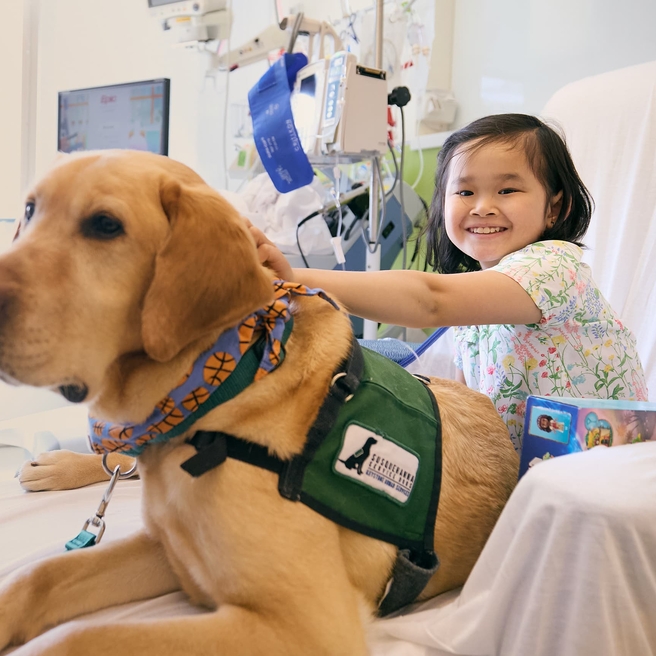
What do you do when you can’t find the right workers for a job? You create them. That’s the approach the clinical laboratory at Children’s Hospital of Philadelphia is taking, with help from The Skills Initiative (previously West Philadelphia Skills Initiative) and Philadelphia Works.
Struggling from a shortage of phlebotomists and recognizing high unemployment rates in the surrounding area, CHOP took matters into its own hands and started a program to train its own phlebotomists.
Participants are paid for the duration of the eight-week training and offered fulltime employment when they complete the program, though there is no obligation to stay at CHOP after the training ends.
To qualify, candidates must have a high school diploma or GED, be currently unemployed, and live in the city of Philadelphia. That’s it: no medical training or experience needed. It’s a great opportunity for participants — and has already proven its worth for CHOP.
Transforming careers
C’Yani Powell was in the first phlebotomy training cohort. When she heard about the program, she had just been let go from her job as a pharmacy technician after her son got pneumonia.
“He was hospitalized the weekend of his third birthday. I had to stay with him. My job didn’t approve of me missing so many days. I was disappointed, and then my mom sent me the link for the program,” she shares. “I never imagined being a phlebotomist, but I figured, what’s the worst that could happen? I’m so glad I took that step, because I love it.”
Now, Powell is a full-time phlebotomist at CHOP. For her, the benefits of the program go far beyond a paycheck.
“My experience with The Skills Initiative and CHOP was and still is phenomenal. The program has helped me with public speaking, professionalism and learning what type of person I am in a work setting,” Powell says. “Most importantly, it helped me get into one of the best children’s hospitals in the world.”
A nationwide shortage
Phlebotomists are in high demand across the United States, and that is especially true in pediatrics.
“A lot of phlebotomists don’t want to stick and draw labs from children. They prefer adults. It’s been a harder-to-fill position,” shares Dana Lyall, senior clinical lab manager.
During the pandemic, this shortage was so severe that the lab relied on workers from temp agencies. This led to high turnover and callout rates, was expensive for CHOP, and negatively impacted team morale.
Moreover, the team found that new employees — whether temporary or full-time — required a lot of on-the-job training to work with children.
“A big lightbulb moment for me was when I realized that even someone with a phlebotomy certificate probably had one hour of exposure to pediatrics during their training, or less,” says Elizabeth Margolskee, MD, MPH, hematopathologist and Associate Chair in the Department of Pathology and Laboratory Medicine. “We were hiring trained phlebotomists and still needing to train them anyway. So why not grow our own from the ground up?”
Training the next generation
Over eight weeks, the CHOP team teaches participants everything they need to know to get started in pediatric phlebotomy. The first four weeks focus on the foundations of healthcare. In the morning, they study medical terminology, anatomy, physiology and other professional basics. In the afternoon, they visit the lab and observe the things they learned about that day.
For the remaining weeks, participants put their skills to the test in the clinical setting, getting hands-on experience with models and, eventually, patients. At the conclusion of the program, they can do anything a traditional hire can do.
Margolskee used data to track the effectiveness of the program and found that The Skills Initiative training cohort did better than the traditional hires in significant ways.
“Samples are considered inadequate if they clot, there is not enough blood to run a test, or the blood cells burst open — something called hemolysis. The people we trained ourselves had lower rates of inadequate samples compared to traditional hires,” Margolskee says. “They also passed through their probation and were up and running independently more quickly than traditional hires.”
These aren’t just numbers. Lower rates of inadequate samples mean fewer return trips and needle sticks for kids, and the potential of an easier path to diagnosis and treatment.
Partnering to find the best candidates
According to Lyall and Margolskee, their organizational partnerships are key to the feasibility and success of the program.
The Skills Initiative, a local community group that finds and develops talent in West Philadelphia and the surrounding area, handles all aspects of recruitment. They also assist with pre-employment training, provide ongoing coaching aimed at retention and offer an extensive alumni network for participants.
Philadelphia Works, a workforce development group that connects organizations with federal on-the job training funds, provides 50% of participant’s wages during the training period. This support is crucial for the program’s viability.
Thanks to this collaboration, two cohorts have already completed the phlebotomy training program. A third training program began in June.
Opening doors
For Lyall, the ability to select participants without a medical background is one of the most rewarding aspects of the program.
“Normally, candidates like the ones we’re training in this program might not even be considered for a role in phlebotomy because they don’t have any equivalent experience,” Lyall says. “This really opens doors for them that they might not otherwise have.”
That’s certainly been the case for Powell.
“My life has really changed beautifully since starting the program,” she says. “It’s been a blessing to be able to say I learned my phlebotomy skills right here at CHOP.”
Featured in this article
Experts
Specialties & Programs
What do you do when you can’t find the right workers for a job? You create them. That’s the approach the clinical laboratory at Children’s Hospital of Philadelphia is taking, with help from The Skills Initiative (previously West Philadelphia Skills Initiative) and Philadelphia Works.
Struggling from a shortage of phlebotomists and recognizing high unemployment rates in the surrounding area, CHOP took matters into its own hands and started a program to train its own phlebotomists.
Participants are paid for the duration of the eight-week training and offered fulltime employment when they complete the program, though there is no obligation to stay at CHOP after the training ends.
To qualify, candidates must have a high school diploma or GED, be currently unemployed, and live in the city of Philadelphia. That’s it: no medical training or experience needed. It’s a great opportunity for participants — and has already proven its worth for CHOP.
Transforming careers
C’Yani Powell was in the first phlebotomy training cohort. When she heard about the program, she had just been let go from her job as a pharmacy technician after her son got pneumonia.
“He was hospitalized the weekend of his third birthday. I had to stay with him. My job didn’t approve of me missing so many days. I was disappointed, and then my mom sent me the link for the program,” she shares. “I never imagined being a phlebotomist, but I figured, what’s the worst that could happen? I’m so glad I took that step, because I love it.”
Now, Powell is a full-time phlebotomist at CHOP. For her, the benefits of the program go far beyond a paycheck.
“My experience with The Skills Initiative and CHOP was and still is phenomenal. The program has helped me with public speaking, professionalism and learning what type of person I am in a work setting,” Powell says. “Most importantly, it helped me get into one of the best children’s hospitals in the world.”
A nationwide shortage
Phlebotomists are in high demand across the United States, and that is especially true in pediatrics.
“A lot of phlebotomists don’t want to stick and draw labs from children. They prefer adults. It’s been a harder-to-fill position,” shares Dana Lyall, senior clinical lab manager.
During the pandemic, this shortage was so severe that the lab relied on workers from temp agencies. This led to high turnover and callout rates, was expensive for CHOP, and negatively impacted team morale.
Moreover, the team found that new employees — whether temporary or full-time — required a lot of on-the-job training to work with children.
“A big lightbulb moment for me was when I realized that even someone with a phlebotomy certificate probably had one hour of exposure to pediatrics during their training, or less,” says Elizabeth Margolskee, MD, MPH, hematopathologist and Associate Chair in the Department of Pathology and Laboratory Medicine. “We were hiring trained phlebotomists and still needing to train them anyway. So why not grow our own from the ground up?”
Training the next generation
Over eight weeks, the CHOP team teaches participants everything they need to know to get started in pediatric phlebotomy. The first four weeks focus on the foundations of healthcare. In the morning, they study medical terminology, anatomy, physiology and other professional basics. In the afternoon, they visit the lab and observe the things they learned about that day.
For the remaining weeks, participants put their skills to the test in the clinical setting, getting hands-on experience with models and, eventually, patients. At the conclusion of the program, they can do anything a traditional hire can do.
Margolskee used data to track the effectiveness of the program and found that The Skills Initiative training cohort did better than the traditional hires in significant ways.
“Samples are considered inadequate if they clot, there is not enough blood to run a test, or the blood cells burst open — something called hemolysis. The people we trained ourselves had lower rates of inadequate samples compared to traditional hires,” Margolskee says. “They also passed through their probation and were up and running independently more quickly than traditional hires.”
These aren’t just numbers. Lower rates of inadequate samples mean fewer return trips and needle sticks for kids, and the potential of an easier path to diagnosis and treatment.
Partnering to find the best candidates
According to Lyall and Margolskee, their organizational partnerships are key to the feasibility and success of the program.
The Skills Initiative, a local community group that finds and develops talent in West Philadelphia and the surrounding area, handles all aspects of recruitment. They also assist with pre-employment training, provide ongoing coaching aimed at retention and offer an extensive alumni network for participants.
Philadelphia Works, a workforce development group that connects organizations with federal on-the job training funds, provides 50% of participant’s wages during the training period. This support is crucial for the program’s viability.
Thanks to this collaboration, two cohorts have already completed the phlebotomy training program. A third training program began in June.
Opening doors
For Lyall, the ability to select participants without a medical background is one of the most rewarding aspects of the program.
“Normally, candidates like the ones we’re training in this program might not even be considered for a role in phlebotomy because they don’t have any equivalent experience,” Lyall says. “This really opens doors for them that they might not otherwise have.”
That’s certainly been the case for Powell.
“My life has really changed beautifully since starting the program,” she says. “It’s been a blessing to be able to say I learned my phlebotomy skills right here at CHOP.”
Recommended reading
All in one place

Genetic testing revealed that Audrey had a rare condition called Beckwith-Wiedemann syndrome. With so many different areas of the body potentially affected, a child needs to be seen by multiple specialists, and CHOP is just the place to help. Donor support helps make it possible.
A day in the life of a facility dog

As a specially trained dog, Dilly helps patients cope with stress and can motivate them during therapy.
Newborns Get New Answers

A program called Baby Eagle spreads its wings by delivering rapid genomic sequencing to critically ill infants at no cost to families.
Contact us
Department of Pathology and Laboratory Medicine